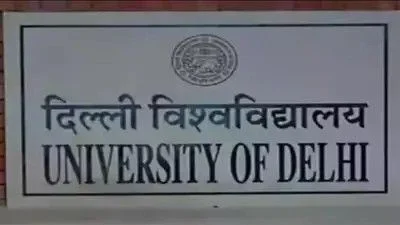New Delhi – A major controversy has erupted at Delhi University after references to jihad, terrorism, self-determination in Kashmir, and the Rashtriya Swayamsevak Sangh (RSS) were included in its newly revised MA Political Science syllabus for the academic year 2025–26, reported the Times of India.
While the Academic and Executive Councils of DU have already approved the syllabus, it is still awaiting final clearance from the Standing Committee on Courses. During a recent review, several faculty members raised objections to specific topics, leading to the course being sent back for revisions.
At the heart of the objection lies an elective paper, DSE 17: Politics and Ethnic Conflicts in J&K, which aims to analyze the “historical, constitutional, and political aspects of Jammu & Kashmir, internal and external dimensions, separatism, insurgency, migration of Pandits, human rights, and special powers of armed forces.” It also includes controversial topics such as “state autonomy, roots of terrorism, and separatist politics.”
Another elective, DSE 51: Religious Nationalism and Political Violence, seeks to explore the role of religious identity in political conflicts, especially in multi-faith societies. The course description says it questions the “complex relationship between religion, modernity, nationalism, and violence.”
Additionally, DSE 14: Identities and Political Transformation in India includes references to the RSS, with scholarly readings from Christophe Jaffrelot, a well-known French scholar and critic of Hindu nationalism and the Narendra Modi government.
These academic inclusions have sparked criticism not just for the nature of the content but also for the apparent contradiction it presents. While the syllabus introduces contentious themes like jihad and RSS, it must be noted that everything Islamic, including the historical contributions of the Mughals, has been systematically excluded from textbooks in recent years under the new educational policy framework. This raises a critical question — Why is ‘jihad’ being introduced now, and from whose perspective is it being studied?
Educational experts and faculty have questioned the intent behind these selective inclusions, pointing out that if the aim is truly academic and not political, then students should be encouraged to understand jihad in its authentic sense. The most accurate and nuanced understanding of jihad can only come through Islamic sources — including the Qur’an, Hadith, classical Islamic scholarship, and modern Islamic thinkers. Misrepresenting such complex theological and socio-political concepts without grounding them in their native contexts could lead to further bias and misconceptions.
This controversy follows a string of syllabus alterations in both undergraduate and postgraduate courses under the New Education Policy (NEP), many of which have been criticized for ideological overreach. In May this year, proposed papers on the Israel-Palestine conflict, issues in Kashmir, and suicides related to dating apps were reportedly removed from the undergraduate psychology curriculum, sparking national debate.
The current developments at Delhi University reflect broader ideological battles being fought within India’s education system. While academic freedom and critical engagement are essential, experts warn against politicization of curricula that selectively include or exclude historical and contemporary realities.




